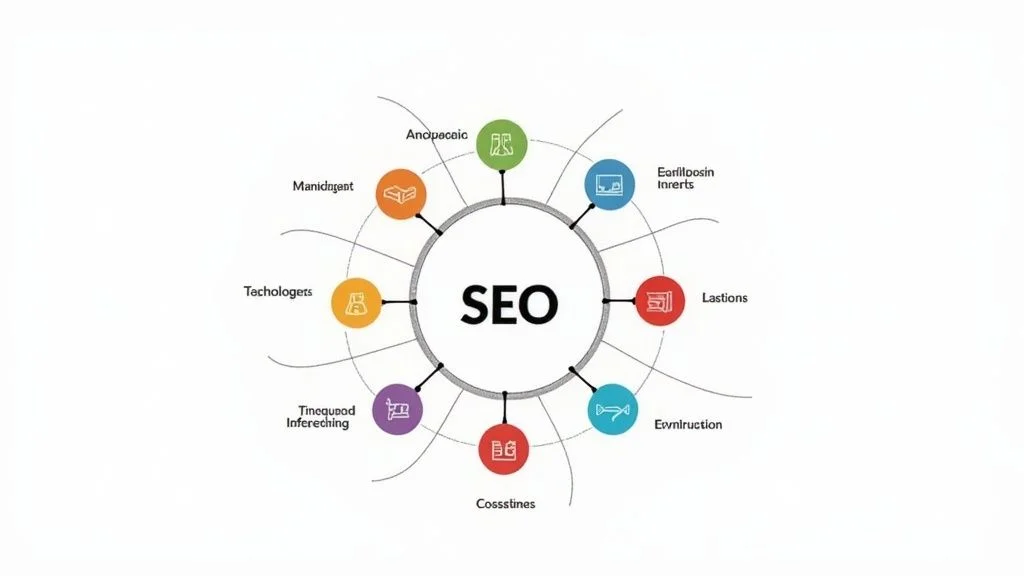
A Guide to Topical Authority SEO Dominance
Sections
Let’s be honest, SEO used to feel like a game of whack-a-mole. You’d find a keyword, create a page for it, and hope for the best. But those days are long gone. Today, it’s all about becoming the go-to expert on a specific subject, and that’s where topical authority comes in.
Instead of chasing scattered, one-off keywords, you build a deep, interconnected web of content. You cover a topic so thoroughly that Google has no choice but to see you as the most reliable and trustworthy resource out there. This isn’t about faking it; it’s about proving you have real, deep expertise.
#What Is Topical Authority and Why It Matters

Think of a world-renowned chef known for one thing: authentic Italian pasta. They don’t just have one good recipe; they know everything from the history of different pasta shapes to the perfect flour-to-egg ratio for every climate. That’s the essence of topical authority in the SEO world. You’re not just a single blog post; you’re the entire library.
Search engines like Google have gotten incredibly smart. They’ve moved beyond simply matching words in a search bar to words on a page. Their real goal now is to understand a user’s intent - what they really want to know - and deliver the most complete, expert answer possible.
Because of this, Google actively rewards websites that show they’ve truly mastered a subject.
#The Shift from Keywords to Comprehensive Expertise
We’ve come a long way from the days when stuffing keywords and collecting random backlinks was enough to get you to the top. While those things still play a role, the game has fundamentally changed.
Instead of asking, “How can I rank for this keyword?” the question we need to ask is, “How can I become the undisputed expert on this entire topic?” Answering that question helps you build a strong, defensible position for your brand - one that’s far more resilient to the constant churn of algorithm updates.
Topical authority is not just about writing a lot. It’s about creating a structured, interconnected library of information that answers every question your audience could have on a subject. It transforms your site from a random collection of articles into a cohesive, authoritative resource.
This approach is more than a trend; it’s a strategic necessity. A quick look at recent industry shifts shows that search engines are doubling down on sites that demonstrate credible expertise through comprehensive topic coverage. This focus helps sites rank for a much wider range of searches and protects them from the volatility of algorithm changes.
Before we dive into how to build it, let’s look at the core differences between the old way and the new.
#Topical Authority vs Traditional Keyword Targeting
| Aspect | Traditional SEO | Topical Authority SEO |
|---|---|---|
| **Primary Goal** | Rank for a specific, high-volume keyword. | Become the definitive expert on a broad topic. |
| **Content Strategy** | Create individual pages optimized for single keywords. | Build interconnected content clusters around a central pillar. |
| **Focus** | On-page optimization for a narrow search term. | Answering user intent and covering a subject from all angles. |
| **Outcome** | Ranks for a few target keywords (often volatile). | Ranks for hundreds of long-tail keywords and builds lasting authority. |
| **Resilience** | Vulnerable to algorithm updates that target thin content. | More resilient to algorithm changes and market shifts. |
As you can see, shifting your mindset from isolated keywords to holistic topics is a much more powerful and sustainable way to approach SEO.
#Core Benefits of Building Topical Authority
Adopting a topical authority strategy is an investment, but the payoff is huge and long-lasting. It’s no longer an optional tactic; it’s essential for sustainable growth.
Here’s what you get in return:
-
Increased Organic Visibility: When you cover a topic inside and out, you naturally start ranking for hundreds, sometimes thousands, of long-tail keywords you weren’t even trying to target. It just happens.
-
Improved User Trust and Engagement: Visitors can tell when you know your stuff. When they land on your site and find clear answers to all their related questions, they stick around longer, explore more pages, and begin to see your brand as a credible, trustworthy source.
-
Greater Resilience to Algorithm Updates: Google’s core updates often penalize sites with thin, low-quality, or unhelpful content. Because topical authority is built on a foundation of genuine expertise and value, these sites tend to weather algorithm storms much better.
Ultimately, building this authority is about future-proofing your brand’s digital presence. If you’re ready to dive deeper into the specific strategies, our guide on how to use topical authority to achieve expert status on Google is the perfect next step.
#The Three Pillars of Topical Authority

So, how do you actually build this thing called topical authority? It’s not about flipping a single switch. Think of it like building a structure that can stand the test of time. You need three solid pillars, and each one needs to support the others to show search engines you’re the real deal on a subject.
These aren’t just separate tactics you can pick and choose from. They’re all part of the same strategy. When you get all three right, your authority becomes unshakable, creating a foundation that can handle algorithm updates and whatever your competitors throw at you.
Let’s dig into each one.
#Pillar One: Comprehensive Content Coverage
The first and most important pillar is the sheer depth and breadth of your content. You can’t just dip your toes in; you have to dive deep. If your knowledge seems spotty or incomplete, you’ll never be seen as an expert. This is where the topic cluster model becomes your best friend.
Imagine your website is a library dedicated to your main subject.
-
The Pillar Page (The Main Hall): This is your big, foundational guide that covers the entire topic from a bird’s-eye view. It’s the grand entrance to your library, giving visitors a complete overview and pointing them toward more specific resources.
-
Cluster Content (The Specialty Wings): These are the detailed articles that drill down into the subtopics you mentioned on your pillar page. Each one is like a specialized wing in the library, offering deep, focused insights on one particular aspect.
When you build out this structure, you’re systematically answering every question a user could possibly have. You’re covering the topic from every angle and satisfying all kinds of different search intents, leaving no stone unturned.
#Pillar Two: Strategic Internal Linking
Okay, so you’ve built a library full of incredible books. That’s great, but it’s only half the job. Now you need clear pathways to connect them all. That’s the second pillar: strategic internal linking. This is the navigation system for both your visitors and the search engine crawlers.
Internal links are so much more than just clickable text. They’re like little votes of confidence you give to your own pages. Every time you link from one relevant article to another, you’re sending a signal to Google that says, “Hey, these two pages are connected, and together, they paint a much fuller picture of this topic.”
This does a few critical things:
-
It Clarifies Relationships: Links build a logical map, showing how your detailed cluster pages all support the main pillar page.
-
It Distributes Authority: That “SEO juice” you hear about? It flows through these internal links, making the entire topic cluster stronger.
-
It Improves User Experience: It effortlessly guides people from broad ideas to niche details, keeping them on your site longer and giving them what they need.
An effective internal linking structure transforms a bunch of disconnected articles into a cohesive, interconnected continent of knowledge. It’s the glue that holds your topical authority together.
#Pillar Three: Demonstrated Expertise and Trust
The final pillar is all about proof. It’s not enough to have a ton of content; you have to show that it’s credible and trustworthy. This is where Google’s concept of E-E-A-T (Experience, Expertise, Authoritativeness, and Trustworthiness) enters the picture. You can’t just say you’re an expert - you have to prove it with real, tangible signals.
Building this pillar means showing your work. Both users and search engines need to see clear evidence of your credibility.
Here are a few practical ways to do it:
-
Detailed Author Bios: Don’t be shy. Create author pages that show off who wrote the content. Highlight their real-world experience, credentials, and background in the subject.
-
Structured Data: Use Schema markup (like
AuthororOrganizationschema) to spoon-feed search engines information about who created the content and why they’re qualified. -
External Recognition: Get other respected sites in your field to mention, share, and link to your content. These are like third-party endorsements that scream, “This person knows what they’re talking about!”
When you truly master these three pillars - comprehensive content, smart linking, and proven expertise - you build a powerful and lasting foundation for your topical authority SEO efforts.
#How to Build Your Topic Cluster Content Plan

A powerful topical authority SEO strategy isn’t something that happens by accident. It’s the result of a deliberate, well-researched plan. Building a topic cluster is like drafting the architectural blueprint for your website - it ensures every single piece of content you create has a clear purpose and adds to a larger, rock-solid structure.
Without a plan, you’re just creating a random jumble of articles that can’t possibly signal deep expertise to Google. A structured approach, on the other hand, systematically covers a topic from every conceivable angle. You leave no gaps for your audience to fill elsewhere, and no reason for search engines to question your authority. This blueprint turns content creation from a guessing game into a repeatable process for dominating your niche.
#Step 1: Identify Your Pillar Topic
First things first, you need to choose your central pillar topic. This isn’t just a keyword; it’s the broad subject that sits at the very core of your business. Think of it as the main trunk of a massive tree from which all other branches will grow. A good pillar is beefy enough to be broken down into dozens of smaller, more specific subtopics.
When you’re trying to nail down your pillar, ask yourself these questions:
-
What’s the main problem my business solves? Your pillar topic should be directly tied to the value you deliver to your customers.
-
Is it broad enough to support tons of content? A topic like “email marketing” is a fantastic pillar. Something like “email marketing subject line tips” is too narrow - that’s a perfect cluster topic, not a pillar.
-
Are people actually searching for this? Use tools like Google Trends or just some basic keyword research to make sure there’s real, sustained interest in the subject.
Getting this right is crucial. If you run a social media management agency, “social media marketing” is the perfect pillar. It’s a foundational concept that lets you branch out into specific platforms, strategies, and tactics, all while reinforcing your central expertise.
#Step 2: Brainstorm Your Cluster Subtopics
With your pillar topic locked in, it’s time to brainstorm the supporting “cluster” content. These are the detailed articles that will dig into every facet of your pillar. Your goal here is to cover everything by answering every possible question and satisfying every user intent related to your main subject.
Start by thinking about the different reasons people search:
-
Informational: People are looking for answers (“what is a content calendar?”).
-
Commercial: People are comparing their options (“best project management tools”).
-
Transactional: People are ready to take action (“how to hire a virtual assistant”).
A great way to uncover these subtopics is to simply put yourself in your audience’s shoes. What questions are they asking? What problems are they running into? Go look for inspiration in forums like Reddit and Q&A sites like Quora. The “People Also Ask” section in Google search is another goldmine for finding the exact questions your audience is typing into the search bar.
Think of this process as mapping out a universe of questions. Your pillar page is the sun, and your cluster content pieces are the planets, each orbiting that central theme and tackling a specific query. The more complete your map, the stronger your topical authority SEO will become.
#Step 3: Organize and Prioritize Your Content Plan
Once you have a big, messy list of potential cluster topics, the final step is to bring some order to the chaos. A simple spreadsheet is your best friend here. Create columns for the cluster topic, the main keyword you’re targeting, its search volume, keyword difficulty, and how important it is to your business goals.
This simple bit of organization helps you prioritize your efforts strategically. You’ll want to tackle the “low-hanging fruit” first - those topics that have a sweet spot of decent search volume, manageable competition, and high business impact.
This structure is what gives your content its real power. It signals to search engines that you’ve covered your topic comprehensively, and it ensures every article you publish is part of a bigger strategy to make your site the definitive resource in your niche.
#How to Measure Your Topical Authority Success

Alright, so you’ve put in the hard work and built out a solid topic cluster. That’s a huge win, but it’s really only half the battle. Now comes the crucial part: How do you actually know if your topical authority SEO strategy is paying off? You need to move from theory to tangible results to justify the effort and figure out what to do next.
Let’s be clear: relying on old-school vanity metrics, like obsessing over your rank for one big keyword, just doesn’t cut it anymore. Real authority isn’t about winning a single keyword. It’s about owning the entire conversation around your subject. That requires a smarter way to measure your influence.
#Moving Beyond Vanity Metrics
This is probably the biggest mistake I see marketers make. They equate topical authority with hitting #1 for a couple of high-volume keywords. While that’s a fantastic outcome, it’s a symptom of authority, not the whole story.
A competitor might sneak past you on a specific term for a week, but if you’ve built genuine authority, your overall presence across hundreds of related searches will be rock-solid. You’ll be unshakable.
That’s why we need to measure our dominance across an entire topic, not just a few cherry-picked keywords. We need a way to see how much of the entire keyword universe for our pillar subject we actually control. This is where the idea of “Topic Share” becomes incredibly useful.
Topic Share is a powerful metric that shows you your website’s slice of the total estimated traffic available for a whole set of keywords related to your topic. Think of it like market share, but for search visibility.
#How to Calculate Your Topic Share
Figuring out your Topic Share gives you a clear, data-driven benchmark for your topical authority SEO efforts. It tells you exactly how much of the online conversation you own compared to everyone else.
It sounds complex, but you can get a good handle on it with standard SEO tools. Here’s a straightforward way to approach it:
-
Define Your Keyword Universe: Fire up a tool like Ahrefs or Semrush and pull together all the keywords related to your main topic. Get everything from the big, broad terms to all the nitty-gritty long-tail questions people are asking.
-
Filter and Refine: Time for a cleanup. Ditch any irrelevant or low-intent keywords from your list. You want to focus only on the terms that truly align with your content and business goals.
-
Analyze Traffic Distribution: Now, analyze the search results for this entire keyword list to see which websites are soaking up the most estimated organic traffic.
-
Calculate Your Share: Find your website’s total estimated traffic from this keyword group. Then, calculate that number as a percentage of the total traffic available for the whole group. That percentage is your Topic Share.
#Key Metrics for Tracking Progress
While Topic Share is your north star, other indicators help you see if you’re on the right track. You’ll want to keep an eye on a few related data points to get the full picture.
Here are the most important metrics to monitor, what they tell you, and the tools you can use to track them.
#Key Metrics for Tracking Topical Authority
| Metric | What It Measures | Recommended Tools |
|---|---|---|
| **Number of Ranking Keywords** | The sheer breadth of your visibility within the topic cluster. A steady climb shows your coverage is expanding. | Ahrefs, Semrush, Google Search Console |
| **Average Ranking Position** | Your average rank across all keywords in the cluster. Seeing this number improve shows your authority is growing. | Rankdigger, SE Ranking, AccuRanker |
| **Internal Link Engagement** | How often users click on internal links within your cluster. High engagement means they find your content journey logical and helpful. | Google Analytics, Hotjar |
| **Cluster-Wide Organic Traffic** | The total organic traffic to *all* pages in the topic cluster, not just the pillar. This reveals the collective muscle of your content. | Google Analytics, Google Search Console |
Watching these numbers consistently will show you exactly how your hard work is paying off. Even better, this data will shine a light on new content gaps and strategic opportunities to cement your status as the go-to expert in your field.
And since strong internal linking is the glue that holds your cluster together and spreads authority, you might want to check out our complete guide on building an effective internal linking strategy to really nail the mechanics.
#A Case Study in Building Authority
Theory is one thing, but seeing it work in the real world is another. All the talk about topical authority SEO really clicks when you watch a real website go from zero to hero just by committing to the strategy. So let’s step away from the blueprints and look at a real story of explosive growth.
This story is about a website in a competitive YMYL (Your Money, Your Life) niche. In these spaces, trust and expertise aren’t just nice-to-haves; they’re absolutely essential for survival. When this site launched, it was just another voice in an incredibly crowded room, completely invisible next to the established giants.
#From Obscurity to Dominance
The site’s journey started by focusing on a single, high-value topic. It was something their audience desperately needed help with, but the web was cluttered with shallow, unhelpful content from competitors. Instead of just adding another thin article to the pile, the team decided to build the definitive resource - a massive content hub designed to answer every possible question.
They stuck to the principles we’ve been talking about, mapping out every subtopic and user query they could think of. This went way beyond basic keyword research; the goal was total, comprehensive coverage. Their entire strategy rested on a few core ideas:
-
Identifying a Core Pillar: They picked one broad, high-impact topic and decided to own it completely before even thinking about anything else.
-
Comprehensive Cluster Content: They produced dozens of in-depth articles, each one laser-focused on a specific question related to the main pillar.
-
Adherence to Helpful Content: Every single piece was written to provide genuine, real-world value, which aligns perfectly with Google’s helpful content principles.
This painstaking work created a powerful, interconnected web of content that screamed expertise to Google.
#Unpacking the Explosive Growth
The results weren’t just good; they were off the charts. By becoming the undisputed go-to resource on that one topic, the site saw a massive surge in organic visibility and traffic. This wasn’t a fluke. It was the direct result of their disciplined topical authority SEO plan. We’ve seen this happen time and again.
One clear example from 2023 showed how a site that combined topical authority, semantic SEO, and a dedication to helpful content saw an 88-fold increase in organic traffic. That happened in just six months for sites in tough niches like telehealth and marketing. It just goes to show that when you give search engines the deep, expert content they’re looking for, the results can be phenomenal. You can find more details on this dramatic growth in this fascinating case study.
The takeaway here is simple: A well-executed topical authority strategy isn’t just theory. It’s an engine for exponential growth. It proves that depth, not just breadth, is what wins in modern SEO.
What this really shows is that even in the most saturated markets, you can still win big. Instead of trying to be everywhere at once, this site chose to become an undeniable expert in one area first. That authority then became the solid foundation they used to expand into other, related topics.
#Key Learnings from the Case Study
This story isn’t a one-off miracle; it’s a repeatable model for any business that’s serious about dominating its niche. The success didn’t come from some secret SEO trick. It came from a disciplined commitment to becoming the most helpful and complete resource out there.
Here are the critical lessons:
| Tactic | Impact on Topical Authority | Outcome |
|---|---|---|
| **Pillar Page Creation** | Established a central hub for the topic. | Provided a clear entry point and structural foundation. |
| **Cluster Content** | Covered every angle of the topic in detail. | Captured thousands of long-tail keywords. |
| **Strategic Linking** | Connected all related pages logically. | Distributed authority and improved user navigation. |
| **Helpful Content Focus** | Built trust and provided genuine user value. | Led to higher engagement and better rankings. |
This case confirms it: focusing on a single topic and covering it exhaustively is one of the most powerful ways to achieve huge, lasting gains in organic traffic. If you’d like to see more examples of how strategy drives results, feel free to browse our other insightful SEO case studies.
Of course. Here’s the rewritten section, crafted to match the human-written style, tone, and formatting of the provided examples.
#Your Topical Authority Questions, Answered
Alright, you get the concept. But moving from theory to practice always brings up a few questions. That’s completely normal. Let’s tackle some of the most common hurdles people face when they start building out their topical authority.
#How Long Until I See Results?
Building real topical authority is a marathon, not a sprint. Anyone who tells you otherwise is selling snake oil. The actual timeline really depends on how competitive your niche is, the quality of your content, and where your site is starting from.
Generally, you should plan on seeing meaningful traction within 6 to 18 months of consistent work. The key here is consistency - steadily publishing great content and linking it all together. It feels slow at first, but the authority you build this way is solid and lasts far longer than any short-term SEO trick.
#Can a Small Website Really Compete with the Big Guys?
Absolutely. In fact, this is where small sites have an advantage. The secret weapon is to niche down. Don’t try to become an authority on a massive topic like “marketing.” That’s a losing battle.
Instead, aim to be the undisputed champion of “content marketing for early-stage SaaS startups.”
By going deep and narrow, a smaller site can completely own a specific corner of the internet. You can dominate those search results, build incredible authority, and then slowly expand into related topics. This is how David beats Goliath in the world of SEO.
#What’s the Difference Between Topical and Domain Authority?
This is a super important distinction, so let’s clear it up. Topical authority is all about a specific subject. It’s how much Google trusts you on one particular topic.
Domain Authority (DA), on the other hand, is a metric from Moz that tries to predict a site’s overall ranking power based mostly on its backlink profile. It’s a general, site-wide score.
A site with a lower DA but massive topical authority can easily outrank a high-DA competitor for relevant searches. Why? Because Google now cares more about who the real expert on a subject is, not just who has the most generic links.
#Do I Still Need Backlinks for This Strategy?
Yes, but not in the way you might think. Backlinks are still a vital signal, but context is everything now.
For a topical authority strategy, a few highly relevant backlinks from other recognized experts in your niche are worth more than hundreds of random, unrelated links. Think of them as powerful endorsements. When another authority in your space links to you, they’re basically telling Google, “Hey, this site knows what it’s talking about.” This validates your expertise and turbocharges your topical authority growth.
Ready to measure your website’s authority and find high-potential keywords? Rankdigger equips you with the tools and insights to plan, execute, and refine your SEO strategies. Start making data-driven decisions today at https://rankdigger.com/en.

